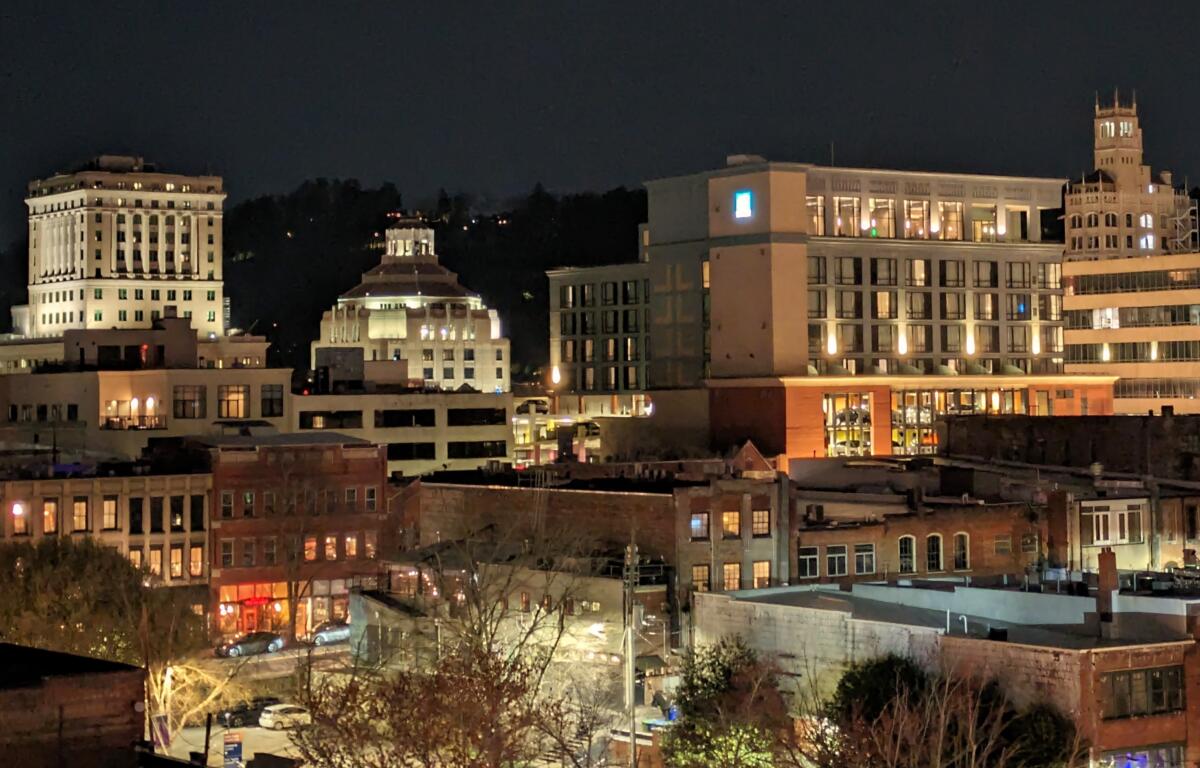ASHEVILLE, N.C. (828newsNOW) —
The Asheville City Council voted 5-1 on Tuesday to advance a proposal to create a downtown Business Improvement District or BID, with members planning to add a separate resolution spelling out ways it will operate before a second vote to finalize the action on June 11.
Council member Kim Roney cast the lone dissenting vote, after colleagues touted the district as a way to collect property taxes within the downtown zone to supplement, not replace, city services on issues like public safety and cleanliness in the center of the city.
One of the most vocal supporters, Council member Maggie Ullman, acknowledged some of the opposition that flared at an emotional public hearing last month, and urged colleagues to address concerns like inclusiveness of the district’s governing board, training for the planned downtown “ambassadors” and other issues in a guiding resolution to be considered on the same night as the final vote on establishing the district.
Ullman said she already wants changes in the original proposal advanced by the Asheville Area Chamber of Commerce, which would have guaranteed a certain number of seats to the biggest property owners within the downtown district. Equating property to power “seems a little archaic. Doesn’t seem like it matches our community,” Ullman said.
Some critics have focused on the downtown “ambassadors” and questioned whether they would have sufficient, proper training to deal compassionately with unhoused individuals or people experiencing trauma.
Mayor Esther Manheimer said that requiring district ambassadors to have proper training in informed crisis intervention could be a key requirement the council could add during a Request for Proposals process to determine the entity that will manage the district for the city.
Since a public hearing already had been held in April, members of the public could not address the council until a public comment period after the vote. However, a number of speakers did appear to present petitions from more than 900 signatories urging the council to reject the proposal before final consideration.
One speaker called the process rushed and said that if the city wanted extra cleanliness and public safety measures downtown, either it should fund them in-house through a regular budget process or let affected businesses fund it on a volunteer basis. One anonymous commenter said on the petitions, “Asheville is not an amusement park and our civil servants need to stop acting like it is.”
HOTLY DEBATED DOWNTOWN DISTRICT FACES ITS FIRST VOTE TUESDAY
The Asheville Area Chamber of Commerce has been rallying support for the proposal, including an online petition and outreach to those who “work, live or simply enjoy Downtown Asheville.”
“With a focus on safe and clean services, such as a hospitality and safety ambassador program, the BID will address pressing issues while fostering a vibrant downtown environment,” the chamber said in its newsletter last week.
“By coming together to advocate for the BID’s establishment, we can ensure Downtown Asheville continues to thrive as a dynamic economic and cultural hub,” it added.
But opponents have been rallying, too. One online “action alert,” posted to Facebook, urged opponents of the Business Improvement District to contact council members to express opposition.
“The BID is created by a special tax with BIG repercussions. It is another way that public space becomes privatized,” the alert stated.
“It puts tourism ahead of local people and in other places has proven to segregate downtown areas economically through private security or ambassadors.”
The alert also said the bill for new taxes generated within the district would get passed on to renters, “making housing less affordable and pushing out small businesses.”
HOMELESSNESS DOMINATES DEBATE OVER DOWNTOWN BID DISTRICT
Before her dissenting vote, Roney said the new property tax downtown would be passed along to renters or business tenants, and ultimately hurt smaller businesses, too. “I don’t know how entrepreneurs are going to be able to afford increasing rent.”
Roney said a Business Improvement District is the wrong tool to use to fix much larger issues affecting the downtown “heart” of the city or the city as a whole, like homelessness, high rents for small businesses and residents, a shortage of affordable housing, low wages or more.
Ullman countered, “I don’t think it’s reasonable to think that any tool will solve all our problems.”
Council member Sage Turner said she was supporting the first vote but that her support on the final vote would depend on how well a resolution addresses some of the concerns that have been raised.
“I want to make sure we’re not rolling out something that isn’t well thought out,” Turner said.


